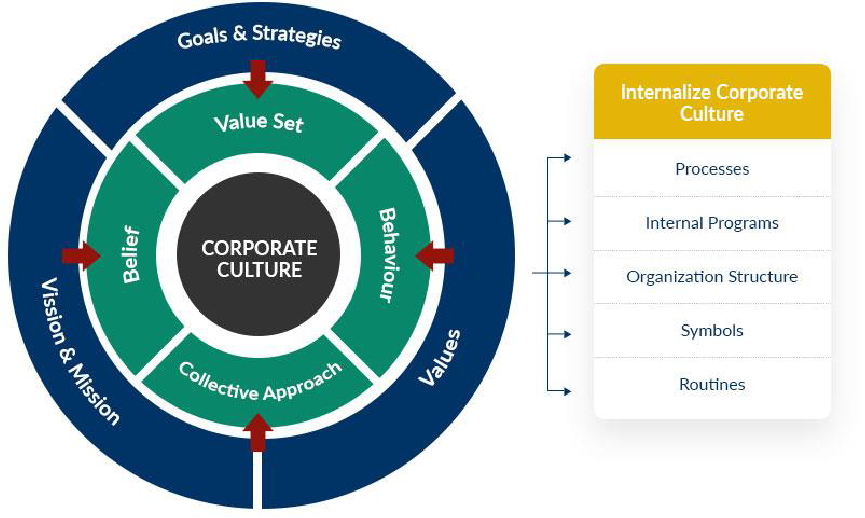Corporate Strategy.
Alpvest’s corporate strategy focuses on delivering an education that combines affordability, accessibility, innovation, relevance, and sustainability. We continuously evolve our programmes and approach to meet the needs of our students and the industries they will enter. This strategy ensures that our institution remains at the forefront of educational leadership and growth.
STRATEGIC PLANNING FRAMEWORK.
3.1. Vision with a Learner Centeredness and a Research Focus
The Vision of the Institution was realigned to the 4iR and the emerging 5iR with a greater emphasis on Learner Centredness and Research. The vision is: "To be a world-class leader in learner centred and future-focused education, championing innovative research, learning and teaching, employability, entrepreneurship, and sustainability, by empowering a diverse community to succeed in a rapidly evolving global landscape."
The following motivating factors and benefits were noted:
- Becoming a World-Class Leader in 4iR and the emerging 5iR Focused Education, Training, and Skills Development by positioning the Institution at the forefront of global education trends, emphasizing a commitment to staying relevant and leading in the rapidly changing educational landscape. This sets a tone of ambition and excellence, inspiring confidence among stakeholders and positioning the Institution as a forward-thinking Institution.
- Learner centeredness by emphasizing the institutions dedication to creating an educational environment where learning is core to all activities, tailored to meet the evolving needs of students and the broader community.
- Championing Innovative Learning and Teaching by highlighting a commitment to employing and developing cutting-edge educational methodologies and technologies and signalling a dedication to continuous improvement and adaptation, crucial for maintaining educational excellence.
- Focusing Employability and Entrepreneurship by directly addressing the practical outcomes of education, preparing students for the job market, and equipping them with the skills to create opportunities through entrepreneurship thus ensuring that the education provided is not just academically sound but also practically relevant, enhancing student career prospects and contributions to the economy.
- Committing to Sustainability by reflecting a commitment to integrating sustainability into education, acknowledging the importance of environmental stewardship and sustainable practices, and preparing students to be responsible global citizens and leaders in a world where sustainability is increasingly critical.
- Empowering a Diverse Community to Succeed by emphasizing inclusivity and the importance of supporting a diverse range of students, acknowledging the richness that diversity brings to the learning environment, and encouraging a learning culture that is respectful, inclusive, and supportive, enhancing the educational experience for all students.
- Succeeding in a Rapidly Evolving Global Landscape by recognizing the challenges and opportunities presented by a globalized world and the rapid pace of change in technology and society in addressing the challenges and opportunities brought about by the 4iR and the emerging 5iR by preparing students not just to adapt to change but to thrive and lead in a global context, equipping them with a global perspective and adaptability skills.
- Research focused on practical educational outcomes ensures that academic programmes are not only rigorous but also relevant to today’s job market and entrepreneurial landscape. This visionary research area aims to align curricula with industry demands and research, equipping students with essential skills for innovation and career success. By integrating this research into educational strategies, institutions can prepare graduates who are poised to drive economic growth and create new opportunities, embodying the transformative potential of education.
The vision statement is aspirational yet grounded, encompassing the key elements of leadership, innovation, and practical outcomes such as employability, entrepreneurship, sustainability, diversity research and global relevance. It aligns with the strategic goals of your Institution and effectively communicates a commitment to preparing students for the challenges and opportunities of the future.
3.2. Mission Statement
Building on the revised Vision the Mission statement for AIFT was amended as follows:
"Our mission is to deliver career-focused, quality education, integrating research, knowledge, skills, entrepreneurship, and sustainability in line with innovative learning and teaching necessitated by 4iR and the emerging 5iR trends, to prepare for global employability in a rapidly evolving world.”
The mission statement effectively encompasses the key elements of the Institution's focus and strategic direction including:
- Being Career-Focused, Quality Education, emphasizing a commitment to providing education that is both professionally relevant and of high quality.
- Integrating of Research, Knowledge, Skills, Entrepreneurship, and Sustainability by highlighting the holistic approach of the curriculum, combining practical skills, entrepreneurial mindset, and sustainability awareness.
- Aligning with 4iR and the emerging 5iR Trends by acknowledging the importance of keeping pace with current and future technological and industrial revolutions, ensuring that the education provided is future proof.
- Preparing for Global Employability by reflecting the goal of equipping students to succeed in a global job market, recognizing the need for adaptability in a rapidly changing world.
- Research is intricately aligned with the demands of the Fourth Industrial Revolution (4iR) and the emerging Fifth Industrial Revolution (5iR) trends. Our research initiatives aim to equip students with the advanced competencies required for global employability in a rapidly evolving world.
The mission statement aligns with the vision of AIFT and effectively communicates commitment to providing education that is relevant, forward-thinking, and globally oriented.
3.3. Mission reflection in existing and new Programmes
This mission is reflected in the current and proposed programmes through various strategic initiatives and programme elements. The following provides an overview of how the vision translates into actionable steps within the existing programmes:
3.3.1. Innovative Learning, Teaching and Assessment:
- The Institution integrates cutting-edge teaching methodologies and technologies into the curriculum.
- Project-based learning, case studies, and real-world applications are implemented to enhance practical skills.
- The academic cohort is encouraged to participate in professional development to stay abreast of the latest educational trends.
3.3.2. Employability Focus:
- Through the Senate and New Academic Programme Development Committees, the curriculum will be regularly updated to align with industry trends and demands.
- By Incorporating industry-relevant certifications and skills training into the programmes the Institution maintains its focus on employability.
- MOU’s, partnerships with companies for work integrated learning, strengthens the focus on employability. The annual career Expo is an example of the focus on employability
3.3.3. Entrepreneurship Integration:
- Entrepreneurship modules feature within the programmes, both ICT and Business.
- The Institution fosters a culture of creativity and innovation through the support for incubator programmes, through which mentorship and resources for students interested in starting their own ventures is provided.
3.3.4. Sustainability:
- Sustainability features strongly in the academic structures and sustainability principles are integrated across disciplines, emphasizing environmental and social responsibility.
- Courses and modules on sustainable practices, green technologies, and corporate social responsibility are offered by the Institution.
- Sustainability projects built into the academic rollout, allow students to contribute to environmental gatekeeping.
3.3.5. Diverse Community Empowerment:
- Entrance criteria offer wide access to academic enrolment and allows previously disadvantaged students access to education.
- The Institution bursary policy allows students with poor financial resources to gain entrance to further education.
- Extracurricular events, diversity training cultural celebrations all create a supportive and inclusive campus.
3.3.6. International Collaboration:
- International collaborations, research conferences and student engagement projects all encourage the global perspective.
- The Institution integrate global perspectives into the curriculum to prepare students for a multicultural and interconnected world.
- Guest lecturers and industry experts from around the world to provide diverse insights and input into curriculum development and delivery.
3.3.7. Quality Assurance & Continuous Improvement:
- By establishing a policy that mandates annual reviews the Institution has established a system for regular curriculum review and updates based on feedback from industry experts and graduates.
- Student surveys and feedback from employers and the advisory board provide regular mechanisms to enhance programme effectiveness.
3.3.8. Industry Collaboration:
- The Institution strengthens ties with industry partners through advisory boards and collaborative projects, while industry professionals participate in guest lectures, workshops, and networking events.
- The programme outcomes align with industry needs to ensure that graduates are well-prepared for the workforce.
3.3.9. Research
- Curriculum Integration of Emerging Technologies: Research initiatives could focus on integrating 4iR and 5iR technologies into curricula and research projects across disciplines. This would involve studying the effectiveness of these integrations in enhancing learning outcomes, developing critical thinking, and fostering innovation among students.
- Sustainability and Entrepreneurship: Another research topic could explore the incorporation of sustainability and entrepreneurship within academic programmes and research projects. This research would aim to assess how well these elements prepare students for the challenges of a globalized economy and measure their impact on students' ability to launch and sustain new ventures.
3.3.10. International Partnership and Collaboration
- Development of joint programmes with international universities and institutions that reflect the mission's focus on 4iR and 5iR. These partnerships could involve collaborative research projects, student exchange programmes, and shared online courses that offer students a global perspective and international networking opportunities.
- International research collaborations specifically targeted at understanding and leveraging global trends in technology and sustainability. These collaborations could result in co-authored research publications, joint conferences, and workshops that bring together experts from around the world to share knowledge and drive innovation in research and educational practices.
3.4. Values that drive AIFT’s Corporate Culture
By aligning each programme with these principles, the Institution effectively embodies its vision and provide students with a holistic education that prepares them for success in a rapidly evolving global landscape.
The following core values encapsulate the Institution's culture, beliefs, and strategic focus:
- Pride in Awards, Heritage, and Achievements: Celebrating the Institution's rich history awards received, heritage, and past successes, while also acknowledging and respecting the environment. This value underlines a deep appreciation of the journey and achievements that have shaped the Institution.
- Affordable and Quality-Focused Learning and Teaching Experience: A commitment to providing an affordable educational environment, marked by continuous quality improvement. This involves creating engaging and enriching learning experiences for students.
- Inclusivity and Accessibility: Ensuring that the Institution is welcoming and accessible to all stakeholders, including regulators, staff, students, and alumni. This value speaks to the importance of creating an environment where everyone feels valued and included.
- International Collaboration and Active Learning: Promoting international collaboration and active learning through partnerships and collaborations, embodying the ethos of a learning organization. This value emphasizes the importance of cooperative engagement in the educational process.
- Learner-Centred Approach: Placing learner success and fulfilment at the forefront, ensuring that each student's educational journey is exceptional and tailored to their needs.
- Community Enhancement: Committed to enhancing the cultural, social, and intellectual life of communities at local, regional, national, and international levels. This value reflects the Institution's role in contributing to societal development and engagement.
- Technology Integration for Greater Success: Utilizing technology as a key tool for enhancing productivity, educational quality, and organizational efficiency. This includes fostering creativity and innovation in both learning and administrative processes.
- Sustainability, Environmental Responsibility and Long-Term Growth: Focused on creating a green culture and ensuring sustainability and growth through robust academic and financial planning. This value underscores the commitment to the long-term viability and progression of the Institution. This includes moving away from excessive use of paper and printing, reflecting a commitment to ecological stewardship.
- Work-Integrated Learning (WIL) for Employability: Impressive emphasis on WIL to increase learner employability, preparing students for successful careers through practical, real-world experiences.
- Responsiveness and Adaptability: Being responsive to the changes and opportunities arising from the 4iR and the emerging 5iR needs, whether in educational trends, student requirements, or global challenges. This value highlights the Institution's agility and readiness to adapt for the benefit of its community.
- Research: Research at our institution is guided by our core values, which encapsulate our corporate culture and strategic focus. These values ensure that our research projects advance knowledge while adhering to ethical standards, fostering inclusivity, promoting sustainability, and encouraging innovation. By embedding these principles into our research agenda, we aim to build a scholarly community that not only achieves academic excellence but also makes impactful contributions to society and global challenges.
These core values support AIFT's mission and vision, driving the Institution towards excellence in providing future-focused education. They ensure that the Institution remains a leader in innovation and technology, while also being a responsible and inclusive community member.

3.5. Strategic Goals and Objectives 3.5.1. Enhance Educational Offerings:
3.5.2. Increase Access to Education:
AIFT’s strategic goals and objectives are designed to align with its vision and mission, driving the institution’s growth and success in the coming years. These goals include:
- Continuously develop and update curricula to reflect the latest advancements in 4iR and 5iR technologies, ensuring that students receive relevant and future-oriented education.
- Expand programme offerings to include new qualifications in emerging fields, such as AI, robotics, data science, and digital transformation.
- Provide flexible learning options through contact, blended, and distance learning modes, making education accessible to a diverse range of students, including working professionals and international students.
Utilize satellite campuses strategically to offer hands-on learning experiences and community engagement opportunities.
3.5.3. Strengthen Industry and Academic Partnerships:
- Build and maintain strong partnerships with industry leaders, tech companies, and other educational institutions to enhance the quality and relevance of AIFT’s programmes.
- Collaborate on research, internships, and real-world projects that provide students with practical experience and industry connections.
3.5.4. Foster a Culture of Innovation:
- Encourage a culture of continuous improvement and innovation within the institution, supporting faculty, staff, and students in exploring new ideas and approaches to education.
- Invest in state-of-the-art technology and infrastructure to support innovative teaching and learning methods.
3.5.5. Promote Global Engagement:
- Expand AIFT’s reach through international partnerships, exchange programmes, and online learning opportunities, positioning the institution as a global player in future-focused education.
- Attract international students and faculty, fostering a diverse and inclusive learning environment.
3.6. Long-term Growth and Development Plans
AIFT’s long-term growth and development plans are focused on establishing the institution as a leader in future-oriented education, both within South Africa and globally. These plans include:
3.6.1. Infrastructure Development:
- Invest in the development of cutting-edge facilities and technology infrastructure to support innovative teaching, research, and student engagement.
- Expand the physical presence of AIFT through the strategic development of satellite campuses, ensuring accessibility and community impact.
3.6.2. Programme Expansion:
- Continuously assess and expand programme offerings in response to market demands and technological advancements, ensuring that AIFT remains at the forefront of education in future-focused disciplines.
- Develop interdisciplinary programmes that integrate multiple fields of study, preparing students for complex, real-world challenges.
3.6.3. Sustainability Initiatives:
- Implement sustainability initiatives across the institution, including energy-efficient buildings, waste reduction programmes, and sustainable practices in curriculum design and delivery.
- Engage students, faculty, and staff in sustainability efforts, fostering a culture of environmental responsibility and social impact.
3.6.4. Alumni and Community Engagement:
- Build a strong alumni network that supports lifelong learning, mentorship, and career development opportunities for graduates.
- Engage with local and global communities through outreach programmes, partnerships, and initiatives that promote education, innovation, and social responsibility.
3.6.5. Financial Viability and Growth:
- Ensure the financial sustainability of AIFT through strategic investments, efficient operations, and diversified revenue streams.
- Explore opportunities for growth through partnerships, new programme offerings, and expanding into new markets, both domestically and internationally.




